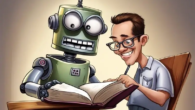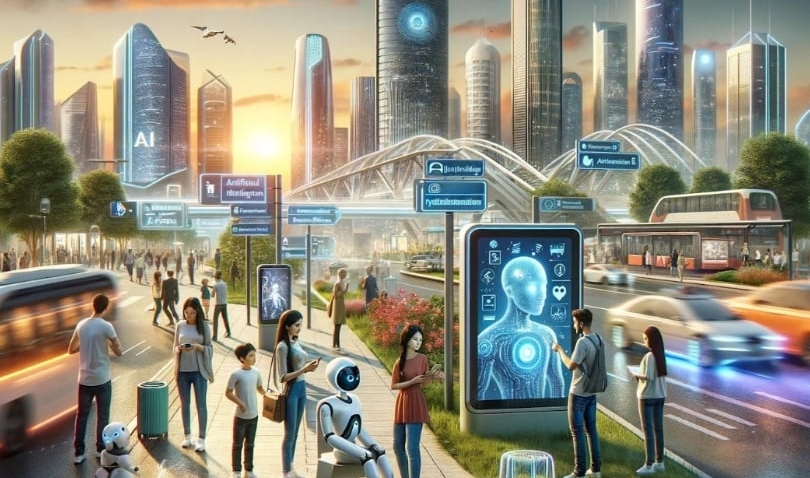
What Does AI (Artificial Intelligence) Mean? Why should you care?
Picture yourself sitting in your favourite chair, getting your headphones ready, and starting your favourite music app. Not only do you hear songs you already know and love, but also new songs that sound just right for you. The amazing thing that Artificial Intelligence (AI) has done is something we do all the time.
Artificial intelligence is the study of creating machines that can learn, adapt, and make autonomous decisions similar to humans.
You pick a couple songs you truly like when you use a music app for the first time. Artificial intelligence systems within the software analyze these decisions in the background. These algorithms understand more than just basic things like genre or artist; they also look at more complex things like melody patterns and rhythm.
The machine learning part of AI comes into play at this stage, which is similar to how people learn. The app learns from the information you give it about the songs you like and finds patterns in them.
After that comes the AI magic.
Based on what it knows about you, the app guesses what new songs you might like.These are well considered guesses based on your preferences, not random selections.
If you mentioned you liked dynamic pop music, the app would presumably recommend similar tunes. The ability to foresee future events lies at the heart of artificial intelligence. An artificial intelligence system makes intelligent decisions based on the knowledge it has gained.
But AI does more than just guess what will happen. It changes and gets better. Read this guide to learn more about what AI is and how much it can do.
Definition: Artificial intelligence
Making robots intelligent enough to perform tasks that often call for human skill is the goal of the computer science field of artificial intelligence (AI).
This area combines many different sub-disciplines, each with its own purpose and applications:
1. Generative AI
Here you can create your own writings, music, images, films, and other stuff. To produce data that resembles its training set, generative AI employs sophisticated algorithms and deep learning techniques.
The significance of this technology is found in its many applications, which include everything from creating material and digital art for entertainment to enhancing data and even assisting in the discovery of new medications by generating molecular structures.
2. Learning by Machine (ML)
Algorithms used in machine learning let computers to learn from data, adjust to experience, and make wise judgments. Advanced healthcare diagnostics, customized e-commerce assistance, and predictive analytics in finance are just a few of the many industries where AI finds use these days.
3. Learning in Depth
In the specialist field of deep learning, many-layered neural networks are used to tackle challenging problems like image and voice recognition and self-driving automobile navigation. Just two of the significant advancements made feasible by deep learning are real-time language translation and sophisticated face recognition systems.
4. Language Processing for Natural Language
Machines that process naturally spoken language (NLP) can understand, decode, and react to human conversation. Among many other uses, its features allow chatbots, sentiment analysis, language translation services, and material summary. The improvement of the natural and user-friendly communication between computers and people is mostly dependent on NLP technology.
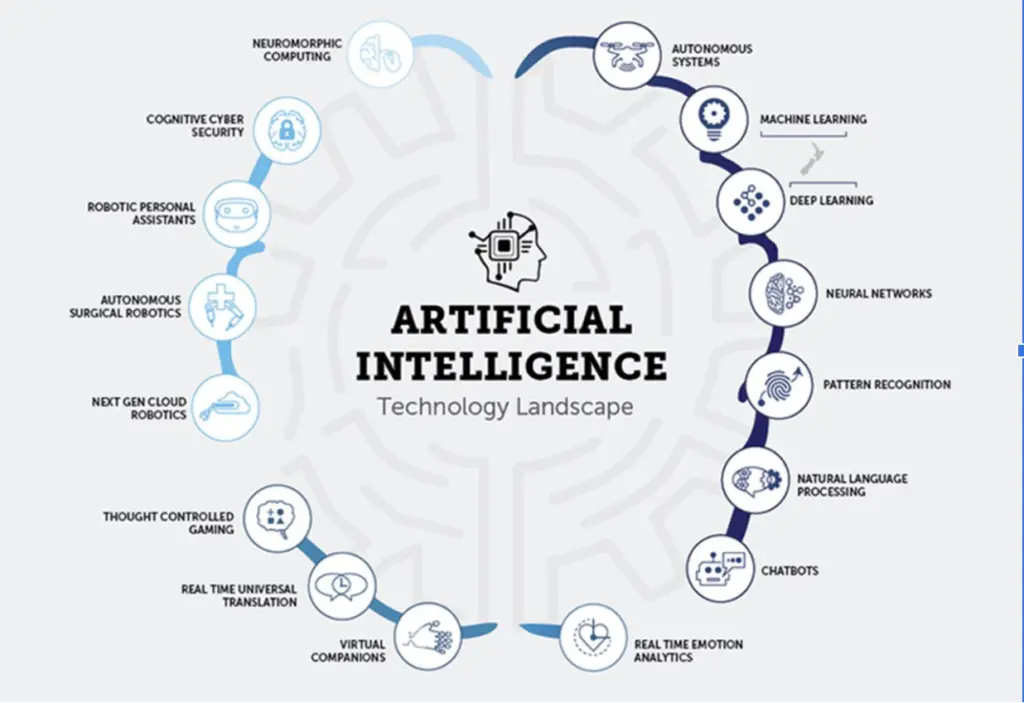
A short history of AI
AI has a long past that starts in the middle of the 20th century with the first theories of computational intelligence.Among the biggest advances include the creation of machine learning algorithms, the first neural network, and the Turing Test.
More recent advancements have demonstrated the potential of artificial intelligence, as demonstrated by Watson from IBM and technologies like ChatGPT and picture generators.
AI affects companies greatly as well as society at large. Numerous facets of life have been transformed by it, including healthcare by enabling early disease detection and customized treatment plans; finance by exposing fraud and enabling algorithmic trade; and transportation by enabling autonomous vehicles.
But there are drawbacks to this technological advancement as well. These include the loss of potentially created jobs, concerns about privacy, and the necessity to consider morality while making decisions.
As AI continues to advance, social concerns gain increasing significance. Many individuals are still debating issues including algorithmic bias, data privacy, and the best application of AI for decision-making and monitoring.
Making ensuring moral values direct AI’s development is crucial to its social integration.
How AI does its job
What is Artificial Intelligence (AI)? It’s important to know that AI works mostly through programmes that let systems learn from their mistakes and get better over time.
Large datasets are used to teach AI systems with these algorithms, especially in machine learning (ML) and deep learning (DL). The learned data then lets the systems make predictions or decisions.
Neural networks, which are like the structure of the human brain, are used in deep learning, a more advanced form of machine learning. These networks are made up of many layers of nodes that are all connected to each other. Each node represents a different mathematical process.
The AI system adjusts the “weights” of the nodes as data moves through these layers. This makes the system better at jobs like recognising patterns, making decisions, and making predictions.
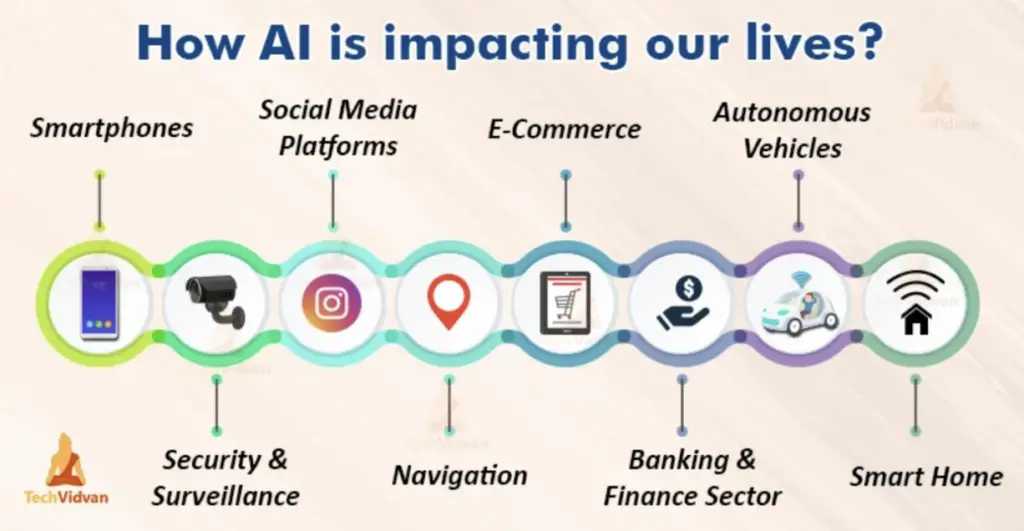
Examples of AI in everyday life
- Digital personal assistants: AI is used by devices like Alexa, Siri, and Google Assistant to understand what you say and respond appropriately. NLP helps them understand spoken language, machine learning lets them tailor answers to each user based on data about them, and speech recognition turns voice into text.
2. Recommendation Systems: Platforms like Netflix, Spotify, and Amazon to look at your past actions and preferences and suggest movies, songs, or goods that you might like. They use complicated algorithms to look for trends in the things you choose and compare them with the choices of other people who are like you so they can give you personalised suggestions.
3.Autonomous Vehicles: AI helps self-driving cars and drones find their way and dodge obstacles. They use sensor data and advanced machine learning algorithms to figure out what’s going on around them, make quick choices, and learn from new experiences to get better in the future.
4. Fraud detection in finance: AI is used by banks and other financial institutions to look for strange trends of transactions that could be signs of fraud. These systems look at millions of transactions to find patterns and flag any unusual activity that isn’t normal for a user’s spending habits.
5. Healthcare diagnosis: AI is being used more and more in medical imaging and diagnosis. Images like X-rays and MRIs can be analysed by algorithms faster and often more correctly than by human radiologists. This helps find diseases early and make personalised treatment plans.
6. Smart Home Devices: A lot of homes now have security cameras, thermostats, and lighting systems that are driven by AI. These gadgets learn from your habits and tastes to save you money on energy, make you feel better, and keep you safer.
7. E-Commerce: AI is used to personalise your online shopping experience from the moment you look for a product to the time you receive suggestions. AI looks at how you browse, what you buy, and even how long you look at an item to make sure you have the best shopping experience possible.
Does AI help?
AI has become an important part of many fields for a number of main reasons:
- Automation of jobs: AI has a big effect by automating jobs. In manufacturing, robots that use AI systems make things more efficient and cut down on mistakes. In the service sector, AI is used to handle routine tasks, which saves time and frees up workers to do more difficult tasks.
- Advanced Data Analysis: In this age of “big data,” AI’s strength lies in processing and drawing conclusions from large amounts of data. This is true in both finance and healthcare, where it is used to look at market trends and make predictions about future diagnoses.
- Better customer service: Chatbots and virtual assistants that are powered by AI make service more efficient by handling many contacts and learning over time to provide more personalised help.
Besides that, AI has an effect on:
- Speed and Efficiency in Making Decisions: AI systems can quickly process data, which is important for making quick decisions in fields like finance or emergency reaction.
- Scalability and Flexibility: AI can grow with a business and change to do different jobs, which makes it very useful as a business’s needs change.
- Personalisation: AI’s study of people’s tastes in shopping and entertainment creates customised experiences that make people more interested and loyal.
- Predictive Maintenance and Quality Control: AI’s predictive maintenance and quality control help industries like manufacturing make sure their products are of high quality and cut costs.
- Cutting costs and making money: AI helps cut costs by making processes more efficient, and it makes money by personalising products and coming up with new business models.
- Improving Research and Development: AI speeds up R&D in material science and pharmaceuticals by guiding tests, which cuts down on time and cost in product development.
Where are we going with AI in the future?
The future of AI is full of huge opportunities and big problems. As AI keeps getting better, people are very interested in and debating how it will affect society, ethics, and the job market.
More recent advances in AI technology
A big change is coming to AI technology: from the current “narrow” AI, which is only good at certain jobs, to a more general AI that can do many things.
This new type of AI will try to understand, learn, and use information in a lot of different situations, just like the human brain does. The progress that AI has made in healthcare is especially encouraging.
We can look forward to more advanced diagnosis tools, personalised treatment plans based on a person’s genetic information, and more accurate robotic surgeries.
Quantum AI is another exciting new area. Combining AI with quantum computing is expected to solve hard tasks much faster than current computers can.
This discovery could change many areas of science and technology, including security, materials science, and climate modelling, opening up new options and ways to solve problems.
Effects of AI on society
AI is about to customise every part of our lives, from fun and learning to health care and shopping, which will raise the standard of living for everyone.
AI could change how cities are run, making public services more efficient, traffic better managed, and city life more sustainable.
As AI becomes more common, privacy, surveillance, and data security problems will get worse. This shows how important it is to make AI systems that are open, fair, and aware of privacy.
The job market and AI
AI has a lot of different effects on the job market, some of which are bad and some of which are good. One of the biggest worries is that work might have to be moved.
As AI and automation technologies spread, big changes could happen in fields like transportation, customer service, and industry. Because of this problem, well-thought-out plans need to be made to lessen its effects.
Some of these strategies could be reskilling programmes to give workers new skills that are useful in today’s job market and changes to the school system to get the next generation ready for the changing needs of the job market.
On the other hand, AI also makes it possible to create new types of jobs. As technology keeps getting better, there will be a greater need for people who work in fields closely related to AI, like data analysis and AI development.
Roles in hacking to protect AI systems and in AI ethics to make sure AI is used responsibly will also grow in importance.
As technology improves, new job categories are being created that show how flexible the job market is.
The very nature of work is going to change because of AI. AI lets people focus more on the creative, strategic, and social parts of their jobs by automating boring and routine chores.
This change could make work more interesting and rewarding by freeing people from doing the same things over and over again and letting them focus on tasks that need human insight and creativity.
Overall, AI does pose some risks to the job market, but it also has the potential to make big changes for the better in the way work is done.
Read our piece on AI news to find out what’s new in the field.
The moral problems that AI brings up: Should we be worried?
As AI develops quickly, it brings up a number of moral and security issues that need to be dealt with in order for it to be safely and responsibly integrated into society. Let us have a look at these issues:
1. Problems with ethics
The chance of bias is one of the most important ethical problems in AI. AI systems learn from a lot of data. If the data has biases, the AI can keep or even increase these biases, which can lead to unfair results in areas like hiring, law enforcement, and credit score.
Concerns about privacy are raised by AI’s ability to gather, analyse, and draw conclusions from huge amounts of data. Private and private information about people could be used in a bad way, which would violate their rights to privacy and confidentiality.
It’s getting harder to figure out who is responsible when AI-driven choices lead to bad results as decision-making processes become more automated and reliant on AI. It is important to make it clear who is responsible: the creators, the users, or the AI itself.
AI systems may start making choices without human help as they get smarter, which brings up issues of control and autonomy. One important social issue is making sure that AI systems don’t do things that hurt people.
3. Problems with security
Hackers can get into AI systems just like they can any other computer system. Hackers can use these holes to mess with AI systems, which could lead to data leaks or even worse, make AI systems act in strange ways.
Using AI in the military, like in self-driving weapons, is very dangerous for security reasons. There are major moral and humanitarian concerns about the idea of AI systems making life-or-death decisions in war.
Deepfakes made by AI are becoming more popular. These fakes look very real and believable, and they can spread false information, affect elections, hurt people’s reputations, and cause social unrest.
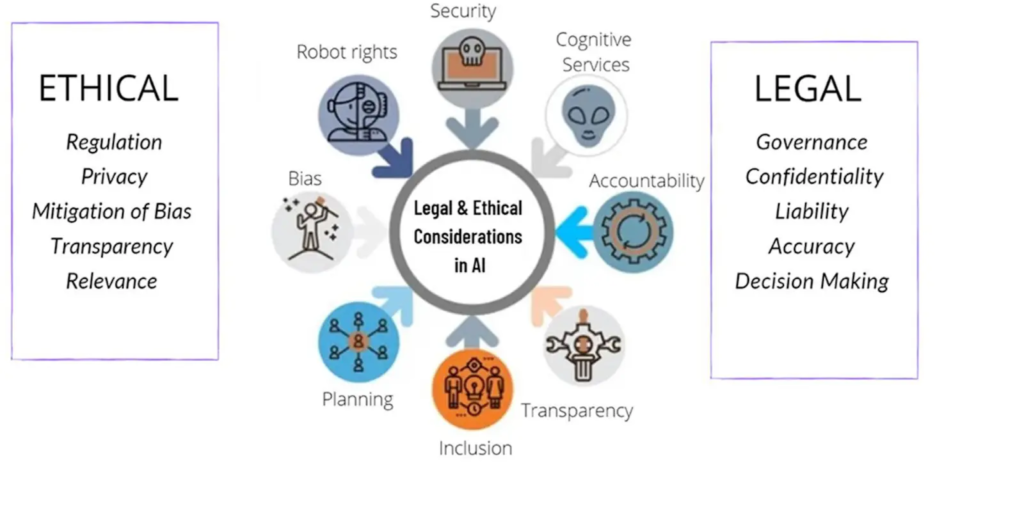
The need for AI programmes that are clear
- Explainability: More and more people want AI systems to be clear and easy to understand, especially in fields like law, healthcare, and banking. For trust and accountability, it’s important to know how an AI system came to a choice.
- Regulation and Compliance: To deal with ethical and security issues, it is necessary to make clear rules and regulations for the creation and use of AI. This includes following data security laws like GDPR and making rules for the moral use of AI.
- Public Awareness and Education: It is very important to teach people about AI, its pros, cons, and risks. People need to know about their rights and how their data is being used as part of this.
Last thoughts
When you think about it, AI can do some really cool things. So many parts of our lives are already changing because of AI. For example, the crazy personalised suggestions that seem to know us better than we know ourselves are one example. AI is also helping to make amazing medical breakthroughs. The present seems to have already passed!
However, AI is very cool, but we need to deal with some very real moral and safety problems. For example, how can we be sure that AI doesn’t discriminate against people or invade their privacy by accident? Who is responsible if an AI system does something really bad?
Transparency and responsibility need to be a top priority for the people working on AI. Smart rules need to be put in place by governments as safety nets. And as a society, we need to learn about both the good and bad things about AI.
AI is a useful tool, but it’s still just a tool. We are the ones who need to be responsible with it and make sure it helps everyone. Who knows what amazing things AI could help us do if we can do that? Things might get better in the future than we thought. We need to do it right, though.
FAQs
How would you describe AI in easy terms?
AI, or Artificial Intelligence, is a field of computer science that focuses on making machines smart enough to do things that normally take human intelligence. It’s basically about making machines or software that can think, learn, decide what to do, and solve problems like a person would.
What are the four kinds of AI?
These are the four kinds of AI:
- Reactive Machines: These AI systems can respond to certain inputs or events, but they don’t store information. The IBM machine Deep Blue, which can play chess, is an example.
- Not a lot of memory: These AI systems make choices based on data and experiences from the past. This is where most AI uses today, like self-driving cars, fit in.
- Thought-based AI: This is a more advanced type of AI that doesn’t fully exist yet. It refers to AI systems that can understand feelings, personalities, and views, as well as act socially like people.
- Self-aware AI: is the most advanced type of AI, but it’s still just a theory. These systems would be alive, know themselves, and feel things.
AI: Is it good or bad?
AI is just like any other tool: it can be used for good or bad things. How AI is used has a lot to do with whether it is good or bad. AI has a lot of benefits, like making healthcare better, schooling better, and businesses run more smoothly. But it also comes with risks, such as losing jobs, worries about privacy, and moral problems.
Where does AI go from here?
People think that AI will have a bright future and that it will keep changing. It will likely get smarter, with better ways to learn, understand, and connect with others in a more human-like way. AI could help solve difficult global problems, make industries better like healthcare, transportation, and finance, and even change daily life with smart cities and homes.
What does AI scare you?
A lot of the “scare” about AI comes from mistakes or over-the-top stories in the media. There are real worries about AI, like privacy, ethics, and losing jobs, but a lot of those worries are based on the worst-case scenarios that can’t happen right now. To lower the risks, AI must be developed and regulated in a responsible way. It’s important to weigh these worries against the good things AI might do for society.







